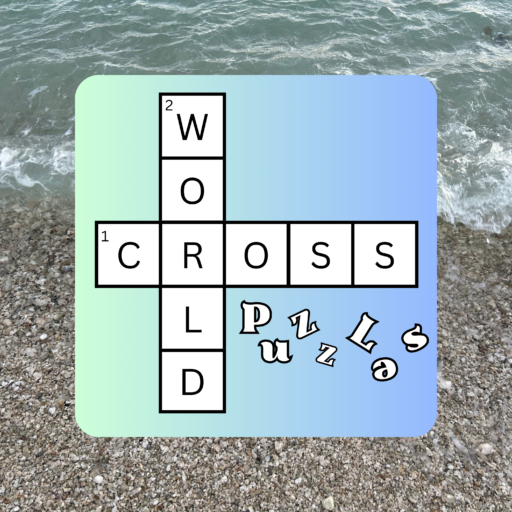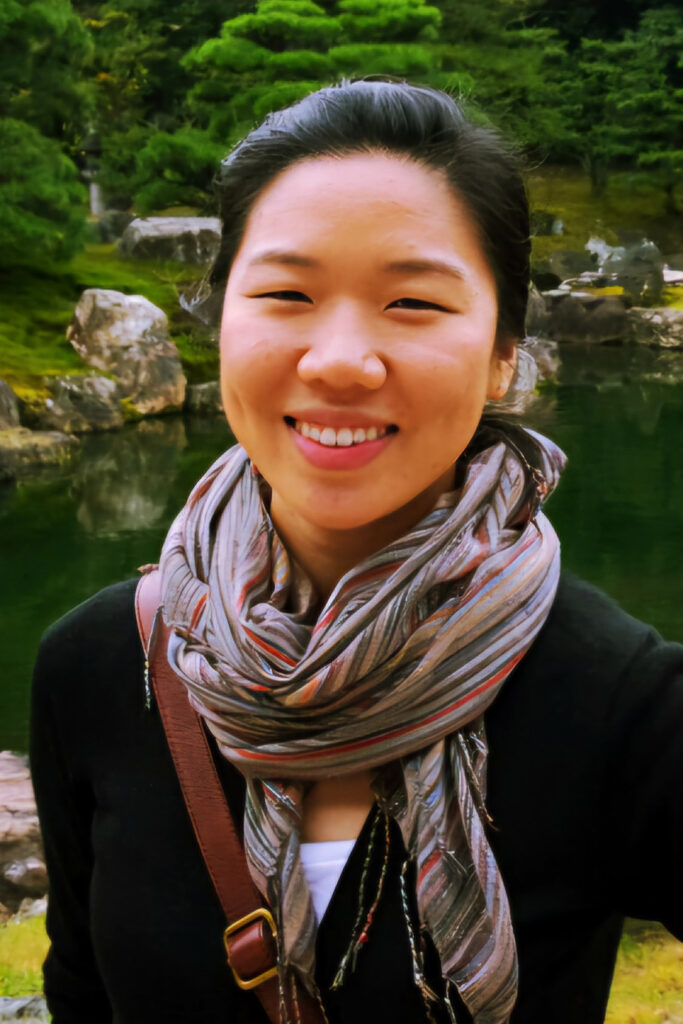
Grace Kim was born in the U.S. to Korean parents. She spent most of her childhood in Japan but also grew up in Korea and the U.S. From 2015 to 2016, Grace lived in Okayama Prefecture, serving as a Coordinator for International Relations (CIR) for the JET Programme. She is now based in Northern Virginia and is the owner and CEO of Grace Eventive, an event planning and logistics company that focuses on cultural and corporate events. She utilizes her program planning and language skills attained over the years to plan events catering to both Japanese and English-speaking clients primarily in the Greater Washington region. She enjoys long walks, going to farmers markets, and eating and sharing food with others. When she is not working, Grace spends her time cooking, baking, tending to her garden (she is a novice gardener), and trying her hand at making various fermented foods such as natto and nukazuke.
(Click on these icons to follow Grace: ![]()
![]() )
)
Podcast
Transcript
Introduction
I’m really honored to introduce Grace Kim, a wonderful friend of mine. She has close ties with not only Japan and the United States, but also South Korea. So that’s what I would like to ask about. She’s also a great event planner and an entrepreneurial and artistic spirit. I’d like to ask about that too. Thank you so much for joining me, Grace.
Thank you so much for allowing me to join your podcast.
Background and Upbringing
I want to ask you about your upbringing, where you were born and raised, as well as your identity growing up.
Sure, I’ll tell you first where I was born and raised. My parents are both Korean. They were born and raised in Korea. They got married and had my sister.
After that, my father decided to pursue his doctorate degree in the U.S. at Ohio State University. So I was born during that time in Columbus, Ohio. I spent about three years in the U.S.
After my father graduated, he got a job in Japan. So we moved as a family to Japan, living in Nara for four years, and Chiba for two years.
Then we moved to Korea once again for my dad’s job. We lived there for about a year and a half.
We moved back to the U.S. in the early 2000s, and we’ve lived here in Northern Virginia for about 20+ years now. But during that time, after I graduated from college, I worked in Japan for a year for the JET [Japan Exchange & Teaching] Programme.
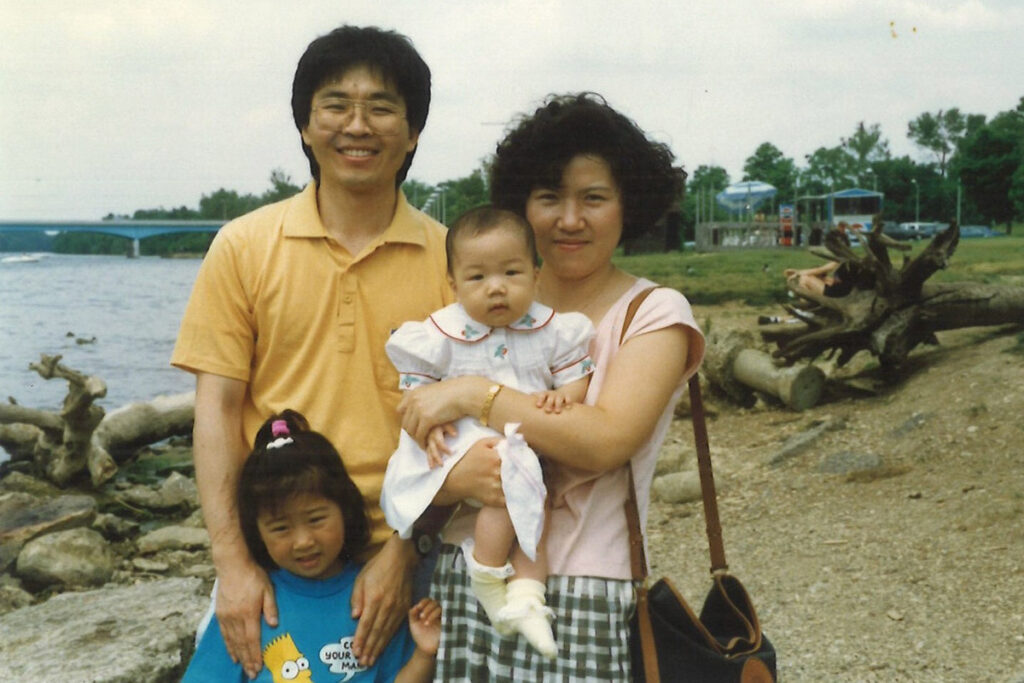
What would you say your identity was growing up, and has it changed over the years?
I was raised in a Korean household, so I knew that I was Korean, and my identity was also Korean. But when I was younger, especially when I was in elementary school, I don’t think I was mature enough to have that realization or have a set identity. I blended in really well with my Japanese cohorts when I attended school in Japan. I have an older sister, and my sister and I both attended public schools. We were able to pick up Japanese pretty quickly, so we didn’t have any difficulties communicating with our classmates.
My sister and I both went by our Korean names. My legal name in the U.S. is Grace Kim. I don’t have my Korean name as the middle name. It’s just Grace Kim. There are so many Grace Kims in the [Northern Virginia] area, by the way! I’m one of many.
My Korean name is Yoonyoung. Typically, “Kim” would be pronounced “Kimu” and written out in katakana in Japan, but when we lived there we went by “Kin” [using the Japanese reading of the Chinese character for “Kim”].
Interesting!
That’s just a phonetically different way of writing it. I don’t know why, but that’s what we went by. So the Korean name that I used in Japan was “Kin Yoonyoung.” So when I was living in Japan, I knew I was Korean, but didn’t have a very strong sense of identity separating me from my Japanese peers.
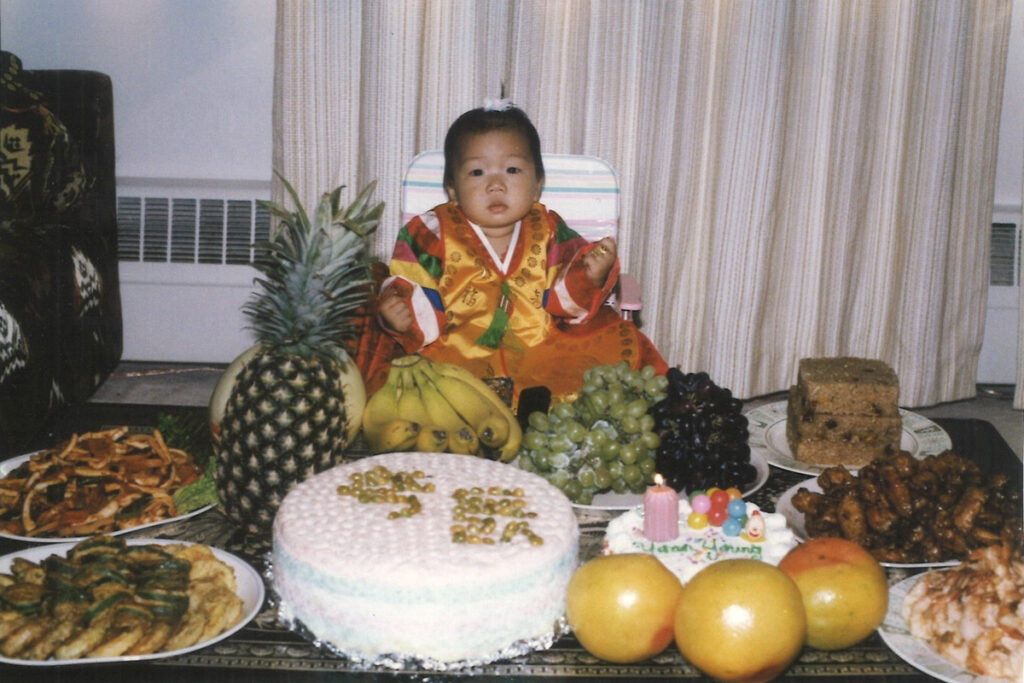
Changes in Identity
What about your identity now? How do you feel?
Now, I would describe myself as a Korean American. That shift happened after I left Japan. In Japan, I didn’t experience any kind of bullying or people picking on me because I was Korean. I was very blessed to have people who are very open-minded, although it was in a more rural area.
Although I grew up in a Korean household and I heard Korean at home because my parents spoke it, my output wasn’t that good. I understood what was being said, but I wasn’t able to express myself very well in Korean. When my sister and I both moved to Korea and started attending public school, I wasn’t able to speak that much Korean or do well in school. So because of that, people, especially boys in the class, would make fun of me, saying, “You’re Japanese!” I’m like, “I’m not Japanese; I’m Korean just like you guys.” I think that was the moment where I felt alienated for the first time, which is ironic given that I was a fully Korean person going to school with fully Korean peers. At that time, I wasn’t sure what my identity was.
But after we moved to the U.S., [I found that] there is a big Korean population in the DMV [DC, Maryland, and Virginia] area. I went to a school in Northern Virginia, and there were many fellow Korean FOBs, Fresh Off the Boat students. So I naturally gravitated towards them as a way to kind of survive school. Once again, I wasn’t able to communicate really well—in this case, in English. I was in ESOL [English for Speakers of Other Languages] at the time, but for non-ESOL classes, I would just group up with my Korean friends. And I think that’s where my identity as a Korean / Korean American started getting stronger, because I hung out with my Korean group of friends more.
I do speak Korean but I’m least comfortable in speaking it, mainly because I’ve lived in Korea the shortest. When we lived in Japan, we visited relatives pretty often during summer and winter breaks, but consecutively I spent the least amount of time there. I feel very insecure when I speak and interact with someone in Korean, even if it’s in the U.S.
Event Planning
Thank you so much. I want to ask you about your career. Would you mind explaining what you do now and what led to this career choice?
Sure. I was working full-time at a non-profit organization before, but at the beginning of this year, I started my own event planning and logistics company. I had dabbled around with it for a year before that, freelancing to see if it’s something I wanted to pursue. And people who have their own businesses or are in similar fields encouraged me to start my own company.
I had no plan whatsoever to start something new on my own. So this has definitely been a big leap of faith. I’m the type of person who wants to know everything about that new thing I want to challenge myself with. But I decided that it would be best to just figure things out as I go. I established an event managing company called Grace Eventive, LLC. I focus on catering to Japanese clients based in the DMV region, because I have that Japanese language ability, and mainly do cultural and corporate events.
How did you become interested in that field to begin with?
At my previous job, I did a lot of program logistics, managing budgets, and coordinating with various individuals to make events happen. And that was one of my strong suits. If I were to start something new, I wanted to utilize that. Event management was something where I could really apply those skills.
I’m not good with big crowds, but when it comes to meeting new people on a smaller scale, I like playing . . . not matchmaker, that’s not the right term, but if so-and-so has an interest in this, I might know of someone else in my network who’s interested in that topic. I like being resourceful to others, and I like getting to know what other people’s interests are so that I can create something new or help forge a new relationship.
That’s great. I also wanted to ask you a little bit more about when you decided to go solo, because I think it takes a lot of courage. And it sometimes can feel a bit lonely, but you said that there were people in DC who were supportive.
It definitely took courage to start this. I hesitated for a long time. Honestly, I looked into other directions: I could get a different full-time job in a similar field, get an additional degree, or get a shorter contract job somewhere else. But ultimately, I felt like those would be a lateral switch and wouldn’t be beneficial or long-lasting, or have an impact on my career. It took a lot of convincing myself and consulting other people to reach the decision to start my own business.
I did feel very hesitant and lonely in the beginning, but I felt better as I went. And speaking to people who had similar experiences or had their own businesses, the more I spoke to them, I realized that a lot of the time they were unsure of what they were doing in the beginning or even as they’re taking care of their business on a day-to-day basis. So that served as encouragement from the network of people who helped me.
That’s wonderful. I think you bring such a unique perspective. I know that the Japan-related community in DC absolutely adores you. We all enjoy working with you because you’re always not only organized, but you have this really in-depth knowledge of the Japanese culture and mannerisms and customs and whatnot. We really appreciate that.
Thank you for saying that.
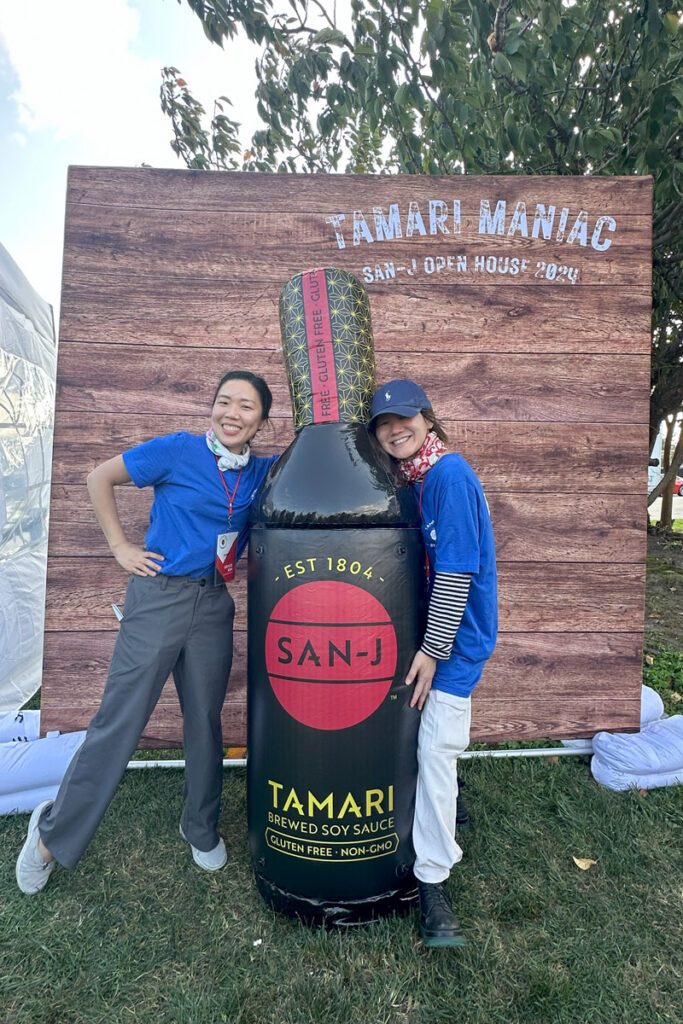
Artistic Side Projects
Related to that, I wanted to ask about your other endeavors. I noticed that you’re wearing your earrings. Would you mind explaining about those?
Yes! These are crane earrings that I made from origami paper. I started making them when I was in college. That’s when the March 11th, 2011 tsunami and earthquake had happened. And I was part of a student organization that was fundraising to help with the relief effort. It wasn’t my idea, but my fellow classmate’s idea to make the crane earrings, selling them and sending the proceeds to the relief effort. I wasn’t into accessory making before that, but I really got into it. I liked arts and crafts since I was little, especially origami.
It’s been a while since I was in college, but I still make it to this day, mainly as a hobby, wearing them to Japan-related events and organizations. This summer, I set up an Etsy store. I haven’t sold anything yet, mainly because I’m not doing anything to promote the shop, but it’s just for my creative outlet and hobby to make crane earrings.
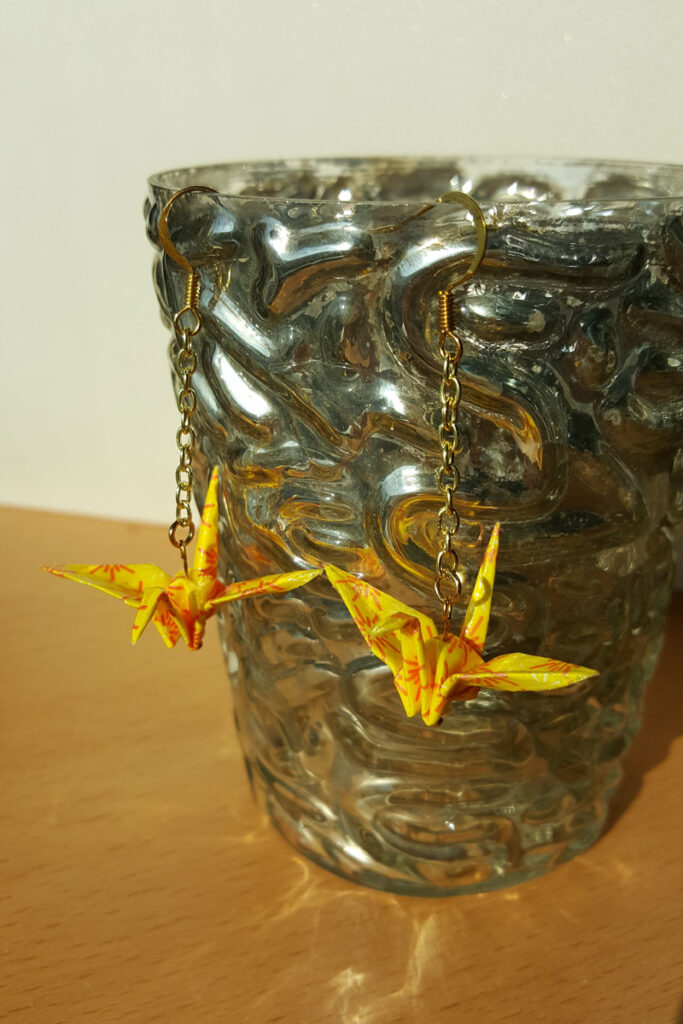
Congratulations! Do you think you might change gears towards that direction? Or do you want to retain event planning as your primary job and then do this on the side?
For now, event planning would be my main gig. I also like handwriting, like hand-designed greeting cards. I do that mainly for my amusement. So anything on that front would be a hobby, including the crane earrings.
You mentioned that you like handwriting cards, but how did you get into typography and that sort of art?
I like hand lettering and I guess Western calligraphy. If I were to put a beginning to that journey, it’d be in sixth grade, when I had cursive exercises that I had to do and submit. I’m not sure if that’s part of the curriculum anymore, or maybe they brought it back. But I had a lot of fun doing the cursive letters. I used to do Japanese calligraphy in a class in elementary school. I wasn’t very good. But for alphabet, cursive letters, I really enjoyed doing that.
And later on, I found out about hand lettering, which is similar to cursive except it’s more freestyle, with more fonts and characteristics. It’s drawn in a way that could look like a logo or a design on a card. So I just looked up a bunch of designs online, and that’s one of the few things that I’ve learned on my own. So yeah, hand lettering, cursive, drawing little doodles—I really enjoy those.
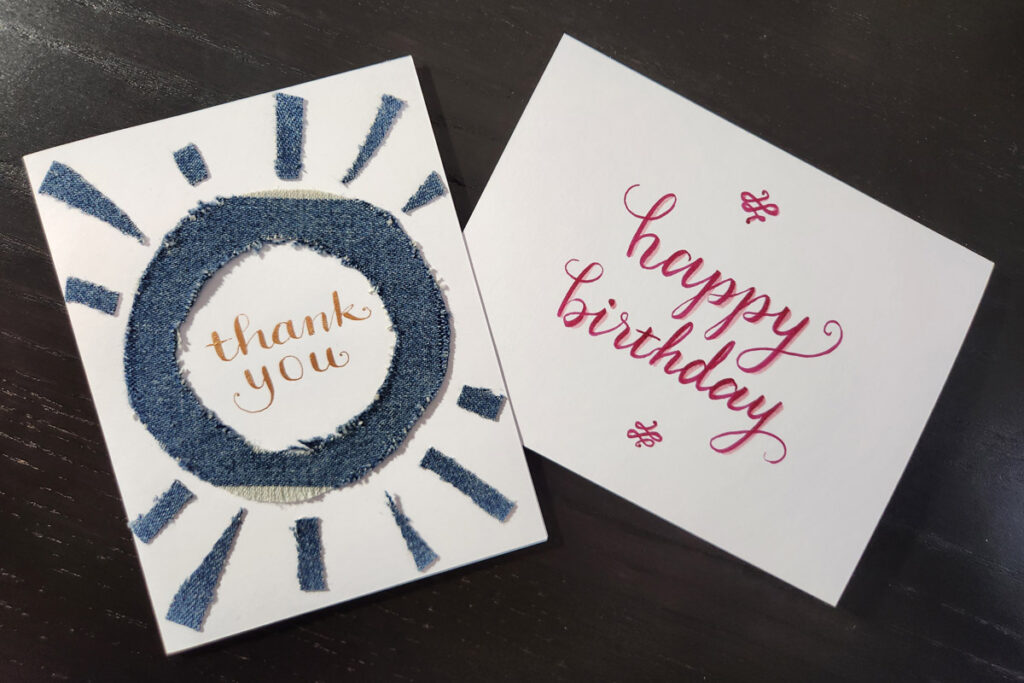
That’s really cool. Have you ever explored Korean calligraphy as well?
Yes. It’s very different in style. I would say Korean calligraphy is more rigid. Again, the extent of my Korean calligraphy skills is just what we did in regular school class, which was very little. I haven’t really practiced it that much, but I like Korean calligraphy because Hangeul, the Korean lettering system, is very geometric. A lot of sticks and circles. It’s very satisfying when you’re writing in Korean calligraphy since it almost fits in its own grid. Whereas in Japanese, it’s more strokes; broad strokes. I haven’t practiced Korean calligraphy in more than 20 years, so it’ll be interesting to reexplore. But for now, I think my interest lies more in English, in cursive and hand lettering with the alphabet more than Japanese or Korean.
Siblings Adapting Differently
I wanted to go back to your identity growing up. You mentioned that you have an older sister. I’m always curious about families with siblings because I’m an only child. When I was growing up, I didn’t have anyone my age that I could talk to about this experience. I was wondering if you were able to talk about your experience in Korea with your sister, and how her identity seems to be similar or different from yours.
Great question. My sister and I, as I mentioned earlier, went to a public school. We have a three- or four-year difference between us, and because of that age gap, she started out with middle school whereas I was in elementary school. So she had a harder time. And she didn’t have a classmate who could interpret for her. I had a classmate who had lived in Japan.
But my sister and I didn’t really talk about our difficulties at the time. Only recently, maybe two or three years ago—that was the first time that we looked back and said, “School in Korea was kind of hard, wasn’t it?” And we’re like, “Yeah, I remember when this happened, that happened.” She said she didn’t get along really well with classmates or had a hard time communicating with the teachers.
And we had a really big culture shock coming from Japan to Korea because of how things were conducted around the classroom. Things as mundane as lunch. Lunch was carried in by a wagon in the Korean classroom, similar to many public schools in Japan. But the culture was so different. In Japan, after everybody’s served, we sit down and say “Itadakimasu (Thank you for this meal / Let’s eat)” and start eating together. But in Korea, people get their food, sit down, and start eating right away. That, to me and my sister, was a huge shock, and there were other things about school culture that were just difficult to adjust to. So we talked about how we assimilated in Korea, but not until recently.
When we moved to the U.S., I started out with elementary school, in sixth grade, and my sister with high school. She hung out more with Korean students, and so did I, but by the time I reached high school, my group of friends was more diverse, because by then I was out of ESOL. I had friends with different ethnic and social backgrounds. So in that sense I had more like a mix of Korean and American identities by the time I reached high school. But for my sister, it might have been different because she started out with high school and stuck with mainly Korean or Asian classmates. So because of our age difference and the grades at which we were in Korea and the U.S., I feel like my sister, if it’s in a spectrum of more Japanese, Korean, or American, she’s leaning more towards Korean.
And I told you earlier that I’m least comfortable in Korean. Interestingly enough, for my sister, she’s least comfortable in Japanese. She understands all the Japanese that’s spoken to her, but for output, she’s more comfortable speaking in Korean. And I think that’s because I had more exposure to Japanese things, or I kept going back to Japanese content more than she has.
It’s so interesting that it’s not only the number of years you spent there and your age, but also your experience that led to wanting to go back physically or virtually to that culture. And I think she teaches Taekwondo, right?
She and her husband run a Taekwondo martial arts studio. She doesn’t teach it herself; she mainly does management. My sister’s a math teacher at a public high school.
Sorry [for misremembering]! That’s amazing. You said that you’re uncomfortable speaking Korean, but you speak it at home, right? So when you say “uncomfortable,” do you mean like honorifics or formal speech?
Both. When I communicate with my family, I speak in English or Japanese. When I speak with my mom and my sister, it’s a mix of Japanese and English. I would throw in Korean names and phrases, but the majority is English and Japanese. And the response back from my mom would be all Korean. From my sister, it’ll be mainly English, sometimes a mix of Japanese and English.
Another weird thing is, I don’t know if other siblings who immigrated to the U.S. later on have a similar experience, but I feel so awkward speaking in Korean with my sister. We almost never speak Korean to each other. Because we grew up speaking Japanese and that’s part of the reason why I was able to keep up Japanese to this point. So the language that I speak is different depending on family member, and it also varies by situation. That’s been how we interact as long as I can remember.
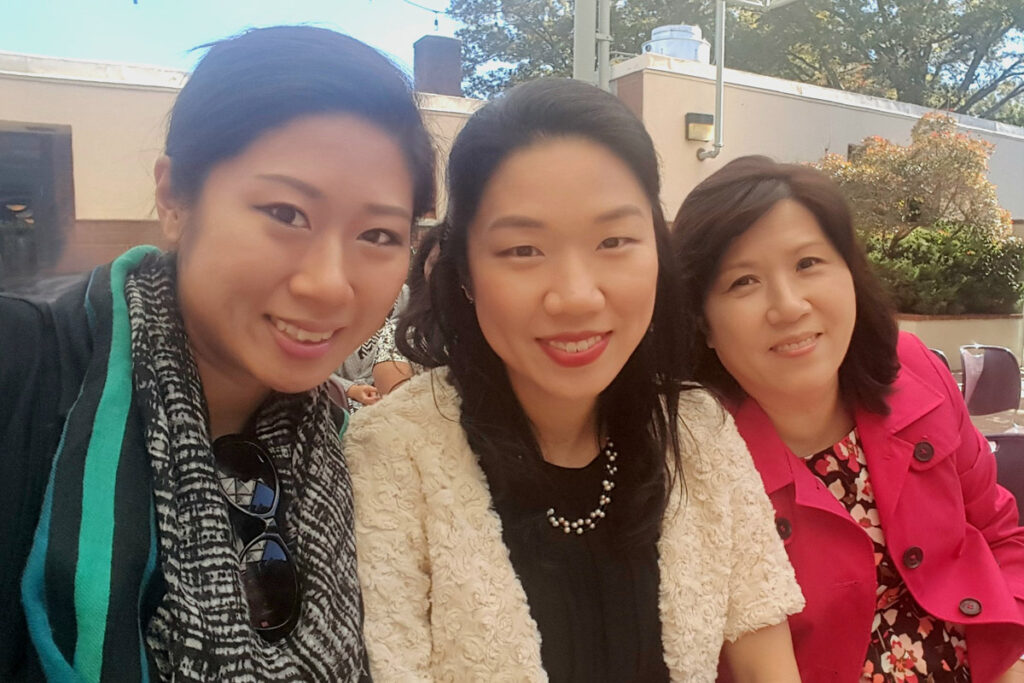
Immigrating to the U.S.
That’s really interesting! Could you tell me why your family decided to move to the U.S.?
We immigrated to the U.S. because my father had passed away in Korea, and all my relatives on my mom’s side were in the Maryland and Virginia area. My mother didn’t have a stable support structure in Korea and she was a stay-at-home mom. She didn’t have a job or a source of income.
And Korea is also notorious for keeping up academic excellence, and to get into high school and college, you have to pass entrance exams just like you do in Japan. Both me and my sister weren’t able to keep up because of the language barrier. So my mother decided that we would have a better future academically if we were to move to the U.S.
We moved to Northern Virginia in 2002, and luckily with the support of my mom’s parents (my grandparents) and relatives, we were able to assimilate to the U.S. culture. It was still hard because we had to practically learn English from scratch and adjust to a new culture again. Being uprooted from what you’re just getting used to and then dropped into another environment has been a challenge. Luckily we were still entertained, so we were able to adjust relatively quickly. The presence of the Korean community was also a plus for all of our family members, including my mom, because we could rely on them for resources and learn how to adjust to new life in the U.S.
It must have taken a lot of courage to move back to the US basically by herself, but with two small daughters. That’s really brave of your mom, and I’m so glad she had a strong support system here.
I can’t imagine what it was like for her. I think she was still in her late 30s when my father passed away. She had to carry a big burden and I’m forever thankful to my mom. And to this day, my sister and I sometimes talk about it, like, “My gosh, can you imagine what our mom had gone through?”
It’s been a journey and a big adjustment getting used to the U.S., but I think I feel most at home in this area now than I do at other places. I would consider the U.S. to be my home country and my hometown, although there’s still a lot for me to learn about.
What are your plans for the upcoming years or decades? Do you plan to stay in the DC area?
I would say so. I like the area that I’m in and my family lives close by. From a business perspective, I want to possibly expand from a Japanese clientele to Korean organizations because there’s a lot of Korean people in the area.
Another Layer of Culture
If you’re comfortable with it, may I ask you about your boyfriend, and if that brings yet another different culture into your everyday life?
Another layer of culture, yes. My boyfriend and I have been together for over a decade. He is Bulgarian American, I guess I should say, but he identifies as American for the most part. He also immigrated to the U.S. when he was in elementary school, so he knows what it’s like to have parents who don’t speak English or don’t know how things work in the U.S. He also has a brother. So a lot of the time, he and his brother had to figure out things on their own or rely on resources other than their parents, which I relate to a lot because that’s how it was for me and my sister as well. He and I both minored in Japanese in college, and we both have great interest in Japanese language and culture.
Do you intend to study Bulgarian at some point?
I tried in the past, but I couldn’t really keep up with it. I know set phrases and some words. His mom doesn’t speak English at all, aside from a few words. So I thought about learning Bulgarian so that I’m able to communicate with her better. But I don’t think the language barrier gets in the way of our relationship that much.
And I rely mostly on my boyfriend and his brother if I want to communicate with her when we’re having a meal together or something. I ask my boyfriend on our daily walks, “How do you say ‘squirrel’ in Bulgarian?” Things like that always come up. He would tell me multiple times, but of course I don’t retain it, so I don’t know.
That’s so cute! It must be hard because it’s a completely different language family.
Yeah. It’s so many consonants back-to-back and I’m not able to really recreate it on my own. The path to mastering Bulgarian is very long and I may not ever achieve it, but that’s okay.
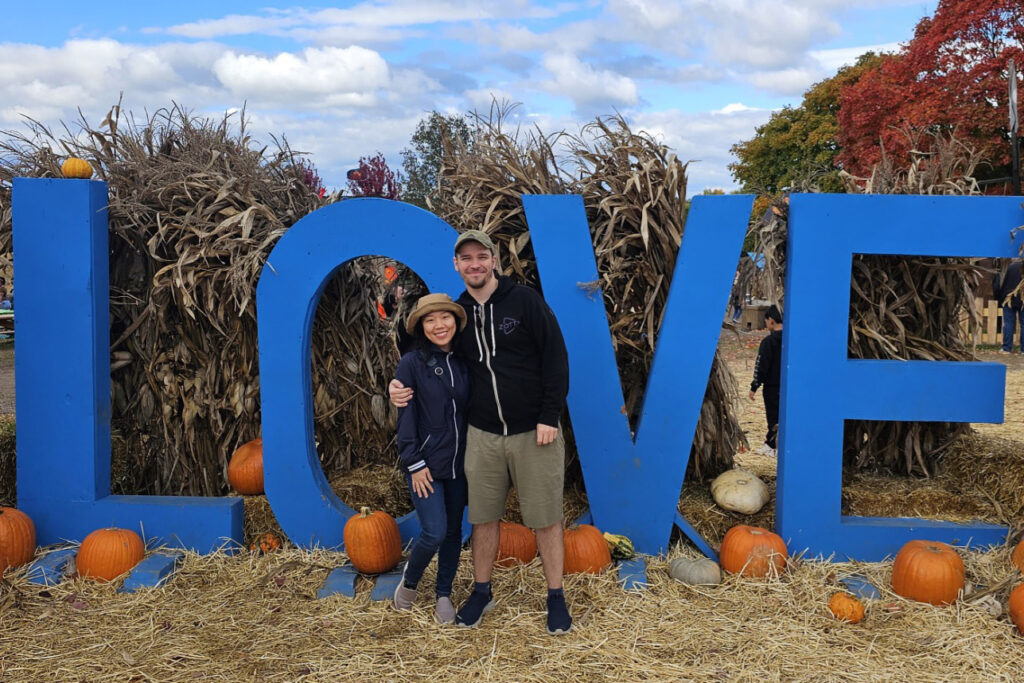
Only One of You
Do you have any messages or advice for people who might be struggling with their identity, or with growing up or being in a multicultural environment?
This is something that I need to keep practicing as well, but it’s really to harness your differences; harness your multiculturalism or multilingualism. Oftentimes, I thought being multilingual was almost an inhibition because I wasn’t able to express my thoughts clearly. But I realized that I could really turn that around and make it my strong suit. And it wasn’t until later in my life that I really internalized that.
So I would say the same to those who might be struggling with their identity: internalize your multicultural background and use that as your skill set rather than something that you’re self-conscious about. And this might kind of sound cliché, but there’s only one of you; each of one of us is unique. If you think about it, there’s no right answer in that sense because every person’s different. There’s no need for us to put ourselves against what an ideal Korean American or Japanese American should be.
Of course, that’s easier said than done, but every time I have an identity crisis, I try to come back to that. If I have those insecurities, I let myself have those thoughts, but try to rein it in and bring it back to “It’s okay to be different; it’s okay that you have all these different sides, because that’s ultimately what makes you who you are.” So that’s something that I’m working on and continue to work on, but if I were to give advice, just embrace your differences and don’t try to hold yourself against others or other ideals and expectations.
Thank you so much. You’re comfortable with who you are, but you’re also very open and honest about how you’re still working on some things. I think that’s something that a lot of people need to hear, myself included.
Well, thank you. I’m glad you see me that way. I definitely don’t! But it’s good to hear that it doesn’t look like I’m spiraling.
Not at all. I think it really connects to a lot of the things we talked about, like how you decided to set out on your own and have your own business, for example. That takes a lot of courage, and I’m sure that’s also played into your identity. Once you do it, it adds to your confidence, and it just becomes better and better. It becomes like a virtuous cycle. And I think you’re doing really well with your business.
I really am amazed by all that you’re accomplishing, but also how humble you are and always thoughtful and kind. So thank you so much for doing this with me. I really appreciate it.
This has been a lot of fun. Thank you for your thoughtful questions.
